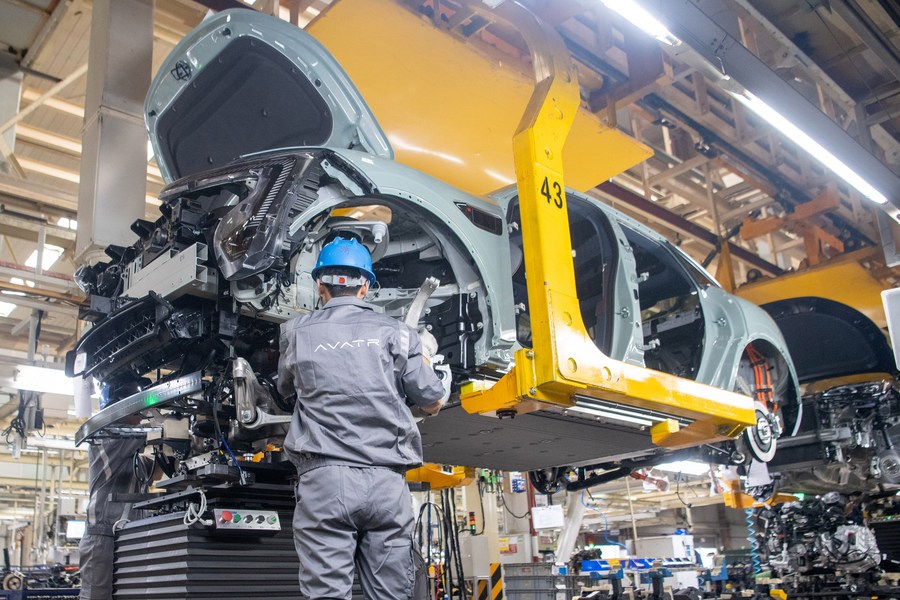China taps consumption potential to sustain high-quality growth

This drone photo taken on Jan. 9, 2024 shows tourists walking on the Central Street in Harbin, capital of northeast China's Heilongjiang Province. (Xinhua/Zhang Tao)
BEIJING, Jan. 21 (Xinhua) -- Robust consumption has been thriving and helping to underpin China's economic recovery, while the country is energetically spurring consumer spending to strengthen one of the pillars needed to support high-quality growth.
China's total retail sales of consumer goods, a major indicator of the country's consumption strength, climbed 7.2 percent year on year to reach 47.15 trillion yuan (about 6.63 trillion U.S. dollars) in 2023, an obvious sign of the Chinese people's growing readiness to purchase.
The annual contribution of final consumption expenditure to China's economic growth was 82.5 percent last year, improving by 43.1 percentage points compared with 2022.
As the final component of economic circulation, dynamic consumption is key for the smooth running of a country's economy. Faced with complicated situations both at home and abroad, China is striving to forge consumption into a powerful engine to drive economic circulation.

Tourists have fun at Harbin Songhua River Ice and Snow Carnival in Harbin, northeast China's Heilongjiang Province, Jan. 3, 2024. (Xinhua/Wang Jianwei)
CULTURAL APPEAL
The "ice city" of Harbin in northeast China has turned into the hottest tourist destination this winter with the city transforming itself into a fairyland, featuring an artificial moon shining above the St. Sophia Cathedral, hot air balloons floating over the Songhua River, a dazzling ice-snow theme park, and mouthwatering local cuisine.
More than 3 million visitors flocked to Harbin during the 2024 New Year holiday period, surging 441.4 percent from the same period last winter, and tourism revenue rocketed 791.92 percent year on year to over 5.9 billion yuan.
This lucrative success has captured the attention of other Chinese cities, and they are trying hard to replicate Harbin's rizz by using the same ingredient -- unique cultural appeal.
Cultural and tourism authorities across the country compete by uploading video clips featuring local cultural elements on social media in bids to woo visitors.
The culture-infused tourist boom at the start of 2024 greatly stimulated consumption with 135 million tourist trips made in China during the three-day New Year vacation, up 155.3 percent year on year, while tourist revenue climbed 200.7 percent year on year to reach 79.73 billion yuan.
Physical stores across the country are introducing novel consumption scenarios, which include ski areas, amusement parks, bookstores and even art museums to attract customers, injecting fresh vitality into offline consumption.
According to a report released by the China Chain Store and Franchise Association, about 400 new shopping centers opened in China last year, while around 60 percent of surveyed cities saw growth in terms of the number of convenience stores in the city.
The upcoming Spring Festival holiday is set to further fuel economic recovery as cultural and tourism demands soar. The Spring Festival, which falls on Feb. 10 this year, is China's most important festival and an occasion marked by family reunions. This year's holiday runs until Feb. 17, one day longer than in previous years.
Bookings for outbound and inbound trips have both recorded in excess of 10-fold increases year on year. Meanwhile, a series of cultural activities will be held by the Ministry of Culture and Tourism to meet public demand during the holiday, with activities including village galas, art exhibitions and cultural experiences at libraries.

Workers operate at a production line of the new energy vehicle AVATR at a workshop of Chang'an Auto in Jiangbei District, southwest China's Chongqing Municipality, July 20, 2023. (Xinhua/Tang Yi)
TECH FORCES
For an increasing number of people living in China's vast rural areas, new energy vehicles (NEVs) are no longer a fashionable way of commuting available only to city dwellers.
A charging station in Sanyuanzhu Village, east China's Shandong Province, is now allowing Wang Yanchuan and his fellow villagers to easily use NEVs. "NEVs are environment-friendly and economical. They make life more convenient," Wang said.
As part of a national campaign to build a high-quality charging infrastructure network across the country, Shandong Province has completed more than 16,000 charging piles, covering over 70 percent of its townships.
In 2023, production and sales of NEVs exceeded 9.58 million and 9.49 million units, surging 35.8 percent and 37.9 percent year on year, respectively.
China's top economic planner, the National Development and Reform Commission (NDRC), said earlier this week that it would move to optimize policies to promote NEV consumption, including boosting NEV development in rural areas.
Technological innovation has also resulted in a galaxy of domestic smartphone makers. In a department store in downtown Beijing, a salesperson told Xinhua that to buy some of the most popular phone models, people need to wait for at least one month, due to the significant demand for such phones.
The NDRC said the country will work to develop new consumption growth opportunities such as smart homes, sports events, domestic products and China-chic goods, adding that efforts will also go into boosting spending on big-ticket items and improving the consumption environment.
In expanding effective investment, greater support will be given to categories such as core technologies in key fields, new infrastructure, energy conservation and decarbonization, the NDRC said.

People visit the 2024 Beijing Book Fair in Beijing, capital of China, Jan. 11, 2024. (Xinhua/Ju Huanzong)
DEEPER POCKETS
Without a job and a ballooning purse, people are usually inclined to save rather than spend. China's central authorities have always attached great importance to people's employment and considered the work of stabilizing employment as a strategic priority.
All regions of the country and government departments have prioritized the task of boosting employment and have moved to optimize pro-employment policies.
The surveyed urban unemployment rate on average in China stood at 5.2 percent in 2023, down 0.4 percentage points from 2022.
Meanwhile, China's per capita disposable income rose 6.3 percent year on year in nominal terms to 39,218 yuan in 2023, and the figure for rural residents grew at a faster pace than that of city dwellers. GDP per capita reached 89,358 yuan in 2023.
China's major state-owned commercial banks further lowered nominal deposit interest rates in December 2023. This was the third deposit interest rate cut by state-owned big banks in 2023, with previous cuts implemented in early June and early September, respectively.
The rate cut could encourage enterprises and people to increase investment and consumption to a certain extent, which will help boost consumption and expand domestic demand, said Dong Ximiao, chief researcher at Merchants Union Consumer Finance Company Limited.
China now boasts the world's largest middle-income group of more than 400 million people. Experts expect the middle-income population to expand to over 800 million in the next 15 years, which means the creation of a gigantic domestic market.
Continued urbanization and rising income levels are expected to sustainably drive consumption growth in the medium to long term, said a McKinsey report titled "China consumption: Start of a new era," which was released in November 2023.
According to simulations by the McKinsey Global Institute, the number of upper-middle and high-income households in China may reach 200 million by 2025 and 260 million by 2030. The number of high-income cities is projected to hit 82 by 2025 and 93 by 2030.
China's economy is steadily evolving towards being more consumption-driven, the report said, projecting China's retail growth, encompassing both products and services, to maintain similar growth momentum to that shown in 2023 in the coming years.
Given China's vast market size, this translates to an additional 10 trillion yuan in retail sales over the next five years, it said. Such growth would make China the single-largest growth market globally, the report noted.
Photos
Related Stories
- China plans to further boost consumption for economic recovery
- Guochao consumption continues to expand in China
- Factbox: Highlights of China's New Year holiday consumption boom
- China's tourism consumption boosted by bustling New Year travel
- Robust New Year consumption points to China's economic vitality
Copyright © 2024 People's Daily Online. All Rights Reserved.









